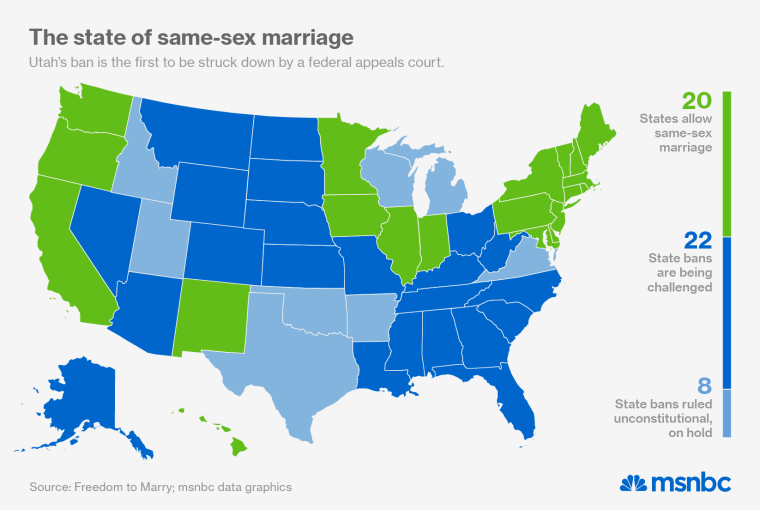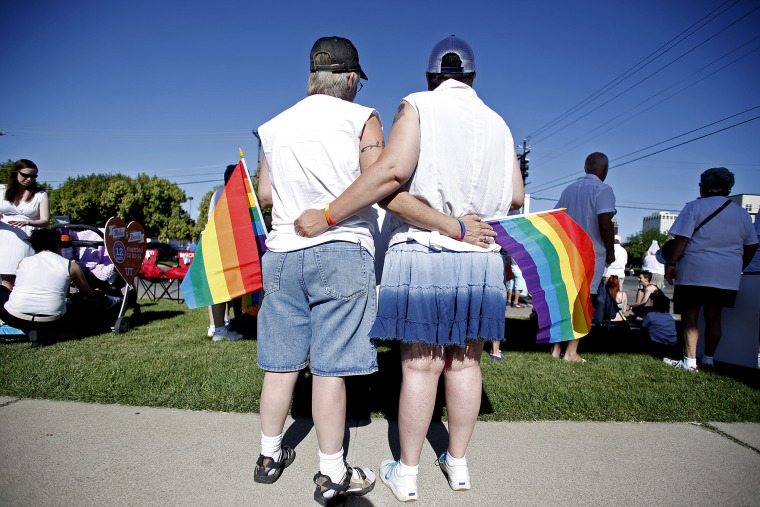Less than an hour after a federal judge struck down Indiana’s ban on same-sex nuptials, making the Hoosier State the 20th in the nation where gay and lesbian couples can wed, a federal appeals court invalidated a different state ban -- in Utah -- for the first time in the last year’s historic wave of victories.
On Wednesday, a three-judge panel of the 10th Circuit Court of Appeals in Denver voted 2-1 to overturn Utah's ban on same-sex nuptials, upholding a lower court’s decision. The ruling marks the first time a federal appeals court has found such a ban to be unconstitutional since 2012, when the 9th Circuit ruled against the now-defunct Proposition 8, California’s constitutional amendment defining marriage as between a man and a woman.
(The nation’s highest court ultimately instructed the 9th Circuit to vacate that ruling, finding that the defendants lacked legal standing to argue on the ban’s behalf. The original district court ruling overturning Prop 8 ended up being the last word in that case.)
The 10th Circuit put its ruling on hold Wednesday, meaning gay and lesbian couples still cannot wed in the Beehive State. Utah officials can appeal either to the entire 10th Circuit, or to the U.S. Supreme Court.
"We hold that the Fourteenth Amendment protects the fundamental right to marry, establish a family, raise children, and enjoy the full protection of a state's marital laws,” the court said. “A state may not deny the issuance of a marriage license to two persons, or refuse to recognize their marriage, based solely upon the sex of the persons in the marriage union.”
Minutes earlier, U.S. District Judge Richard Young, a President Clinton appointee, struck down Indiana’s ban on same-sex nuptials and did not put his ruling on hold. He joins 13 other federal judges who have ruled in favor of marriage equality since the Supreme Court’s landmark decision to strike down Section 3 of the Defense of Marriage Act (DOMA) exactly one year ago Thursday.
“The court has never witnessed a phenomenon throughout the federal court system as is presented with this issue,” Young wrote in his 36-page opinion, released Wednesday. “In less than a year, every federal district court to consider the issue has reached the same conclusion in thoughtful and thorough opinions – laws prohibiting the celebration and recognition of same-sex marriages are unconstitutional. It is clear that the fundamental right to marry shall not be deprived to some individuals based solely on the person they choose to love.”
Indiana and Utah are two of the most conservative states in the nation, adding even greater significance to the day’s events. As marriage equality continues to spread (10 more states in the last year alone), long-held opposition in some of the reddest parts of the country has begun to thaw. Six Republicans in Congress now support marriage equality, and the ones who don’t largely keep quiet on the issue. While many still hold that marriage laws should be dictated by the states, the growing legal consensus suggests the opposite -- that the constitutional rights of gay and lesbian citizens cannot be up for debate.
In a statement, Derek Kitchen, one of the plaintiffs in the Utah suit, said he was “overjoyed” by the decision.
“Since the lawsuit was filed last year, we have received so much support from so many people in our state, and we are now looking forward to the day when we will finally be married,” he said of his partner, Moudi Sbeity.
Last year, U.S. District Judge Robert J. Shelby struck down Utah’s 2004 voter-approved amendment limiting marriage rights to heterosexual couples. That decision opened up a two-week window during which more than 1,000 gay and lesbian couples were able to marry in the state. The U.S. Supreme Court then halted further same-sex nuptials from taking placed for the duration of the appeals process.
In April, Utah’s suit became the first to reach the appellate level amid a tidal wave of marriage equality litigation, fueled in large part by last year’s DOMA decision. The same three-judge panel also heard arguments in a federal challenge to Oklahoma’s ban, but the court hasn’t issued an opinion in that case yet. Both suits -- as well as Indiana’s -- stand a chance of drawing a broad ruling from the U.S. Supreme Court that legalizes marriage equality throughout the nation. However, there’s no telling how or when the justices would rule, or even which case they would agree to hear, should they agree to hear one at all.
Despite thus uncertainty, LGBT advocates were excited about Wednesday’s decisions.
“This is a proud day for everybody in the state of Utah, and everybody across the country, who supports marriage equality,” said John Mejia, legal director of the ACLU of Utah, which submitted an amicus brief in support of the plaintiffs. “Though there is still much to do, the journey to ensuring the freedom to marry for all just got a huge boost with today’s decision.”

